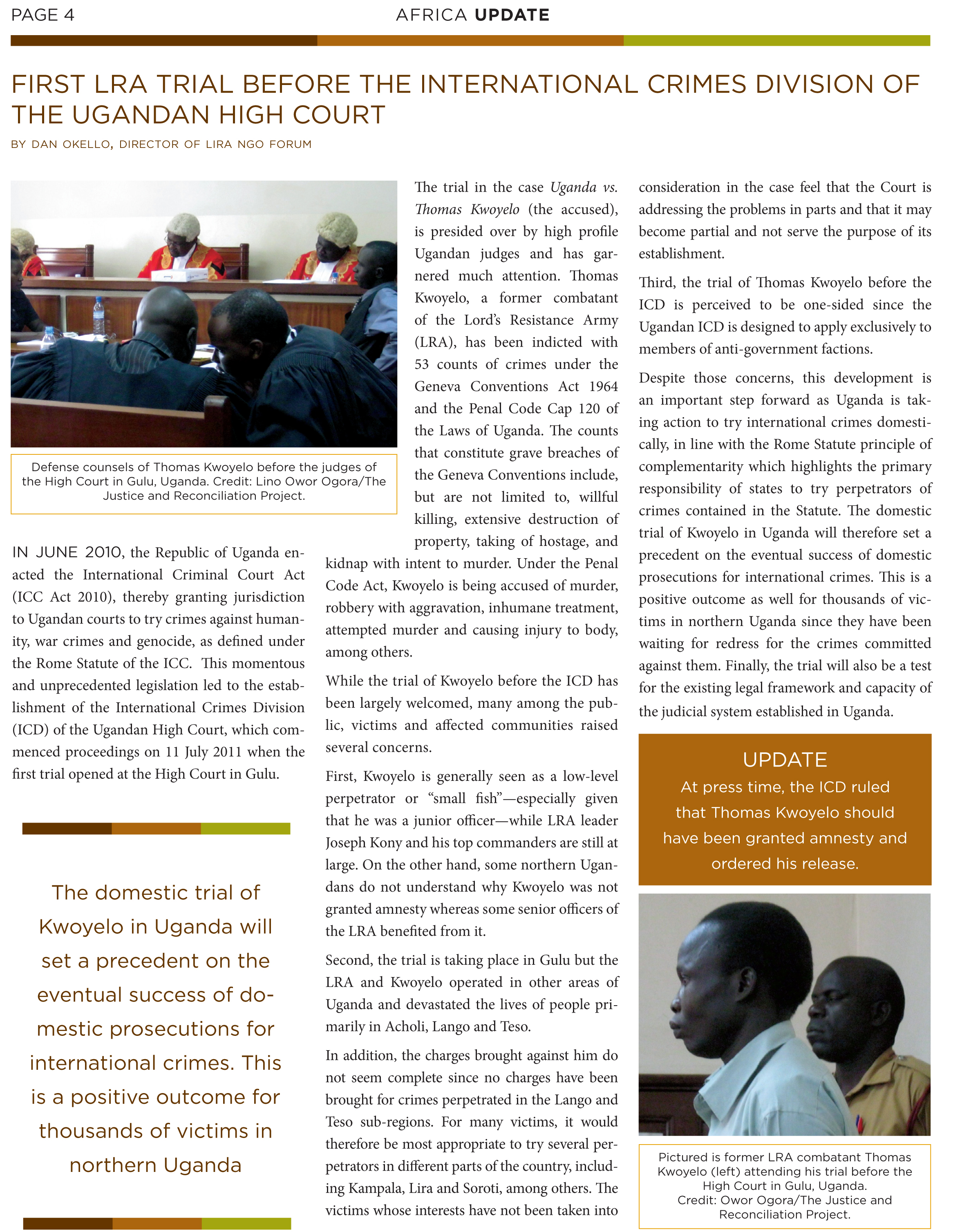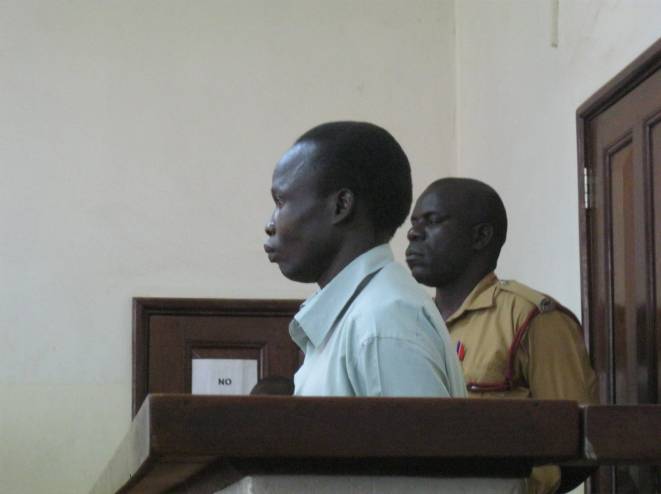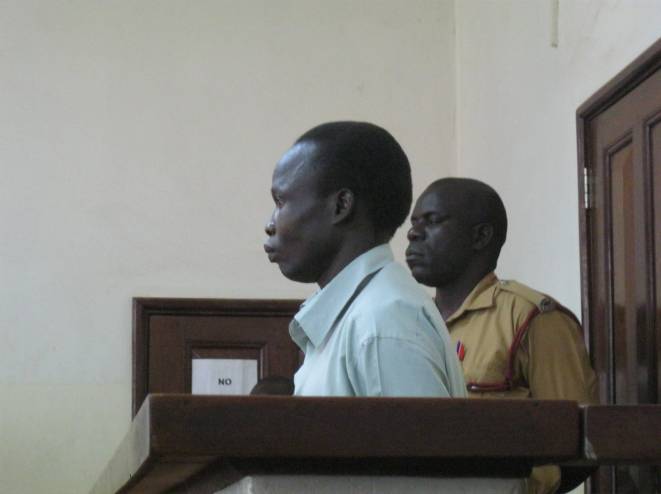“Public divided over Kwoyelo trial,” Daily Monitor, 10 July 2011
http://www.monitor.co.ug/News/National/-/688334/1197660/-/bylc79z/-/index.html
By Moses Akena
In Summary
About the War Crimes Division
- The ICD is one of the specialised divisions set up in the High Court to try the commanders of the LRA and other rebel groups, who have violated human rights during the two-decade war in Northern Uganda.
Initially known as the War Crimes Division, it was set up in 2009 by the government as part of its efforts to implement the 2008 Juba peace agreements between the Ugandan government and the LRA.
- The division has the authority to try genocide, crimes against humanity, war crimes, terrorism, human trafficking, piracy and any other international crime defined in Uganda’s Penal Code Act, the 1964 Geneva Conventions Act and the 2010 International Criminal Court Act (ICCA).
- The division may sit as a bench of three judges. The Court is headed by Justice Dan Akiiki-Kiiza and other judges are Justice Anup Singh Choudry and Justice Owiny Dolo.
As he steps into the dock tomorrow for trial by the War Crimes Division of the High Court of Uganda, former Lord’s Resistance Army colonel Thomas Kwoyelo, will write a chapter in the history books as the first commander of the rebel outfit, to be tried in the court.
The trial comes three years after the formation of the Court. The trial of Kwoyelo will also be the first for war crimes that a prosecution will take place under the Geneva Conventions Act since it was passed in 1964.
In March 2009, Kwoyelo was injured and taken into custody following fighting between the Ugandan army and LRA fighters in Ukwa, DR Congo. He was subsequently treated by the government of his bullet wounds.
He was first held in unknown military intelligence facilities, then Gulu Prison in late 2009 and has been held in Luzira maximum prison for a while.
Kwoyelo was first produced in a fully parked Chief Magistrate’s Court in Gulu in September 2009, to answer to 12 counts of kidnap with intent to murder which, was read out to him by then Gulu Chief Magistrate, Joseph Omodo Nyanga.
Amnesty in vail
A year later, in August 2010, he was charged with violations of the 1964 Geneva Conventions Act, including the grave crimes of willful killing, taking hostages and extensive destruction of property in the Amuru and Gulu districts of northern Uganda.
Though he applied for Amnesty last year, Amnesty Commission is yet to reply to his request. The Commission said it referred the case to the Directorate of Public Prosecutions as required under the act when individuals are in custody, for determination of eligibility.
The DPP has not responded to the Amnesty Commission’s request, raising some questions about the arbitrariness of the process.
It is not known how long the trial will but government said it will call close to 90 witnesses to testify. Cases involving war crimes and those against humanity tend to be difficult, because of the range of incidents and extended time period involved in the charges.
Since November 2010, Kwoyelo has been represented by private lawyer Caleb Alaka.
Though not one of the indicted five top commanders of LRA, Kwoyelo was captured by UPDF in battle and has since been treated as a prisoner of war.
The LRA top leadership is accused of crimes against humanity by the International Criminal Court (ICC). And in 2005, it issued arrest warrant for its elusive leader Joseph Kony, Dominic Ogwen and Okot Odhiambo. Others Raska Lukwiya and Vincent Otti have since died.
Kwoyelo is the first member of the LRA to be in this situation and if found guilty, he will be sentenced to life imprisonment as per the Uganda’s Geneva Convention Act. It also provides a maximum penalty of 14 years imprisonment for the other crimes.
The impending trial has generated huge public interest in northern Uganda with mixed reaction about the trial. Gulu, where the trial will take place bears the brunt of the two-decade war.
Justice wanted
Mary Adibu, 61, who said she fell into a man hole while running from the LRA and broke a collar bone in Laliya, near Gulu town, says she wants to see justice done for the LRA victims.
“They should be tried because they made us suffer so much in their hands,” she said. Gulu district boss Martin Ojara Mapenduzi, said the trial should open the eyes of some LRA commanders and some senior figures in the government that they cannot commit crimes with impunity and get away with it.
He said this will help reassure the people of northern Uganda who want the perpetrators of the atrocities answer for their actions.
“I am very confident that the war crime division will do what is believed to be true justice and the people of northern Uganda are waiting to hear the outcome of this,” he said.
However, others like Lino Owor Ogora, the Team Leader Research Advocacy and Documentation at the Justice and Reconciliation Project in Gulu, Kwoyelo’s trial is selective.
“I think the war crime division really wanted to have a case on the ground because we are failing to understand why and how they arrived at Kwoyelo,” he said.
Some people Sunday Monitor talked to had little knowledge of Kwoyelo, compared to other LRA leaders like Onen Kamdulu and Kenneth Banya. Many insist that since he was following orders from his superiors, he should not be sacrificed for the ‘big fish’.
“I don’t think he is guilty because he was acting on orders from his bosses,” said a 50-year-old woman who refused to be named because she is a wife to a soldier.
LRA Victims like Ms Irene Laker argue that allowing the rebels to integrate into the community and engage in projects to help the people they maimed is more realistic.
Laker was hit by land mine planted by the LRA on her door steps.
She has an artificial right leg and she is one of the 268 members of land mine survivors association from Gulu, Amuru and Nwoya districts.
“I think they should just forgive him because for me, I am already lame and there is nothing he can do to bring back my legs,” said Ms Laker.
Critics of the trial have claimed that the fact that Kwoyelo has not been granted amnesty and is to be prosecuted is politically motivated, given that so many other LRA commanders have benefited from amnesty.
Off the hook
“For example, the former LRA high-ranking commanders Brig. Kenneth Banya and Brig. Sam Kolo Otto, as well as Lt Col. Opio Makasi, who served as the LRA director of operations, have all received amnesty under the act over the last several years. Several other LRA members who applied for amnesty were not prosecuted and instead joined the Ugandan army to fight the LRA,” said Human Rights Watch on its website.
HRW points that amnesties for crimes such as war crimes and crimes against humanity run counter to international law and practice, which rejects impunity for the gravest crimes. “International and hybrid international-national war crimes courts outside Uganda have rejected amnesties for serious crimes,” said the Rights body.
Who is Thomas Kwoyelo?
Thomas Kwoyelo is a former commander in the Lord’s Resistance Army (LRA), who is from Acut Cama village, Pabbo Sub-county in Amuru district.
His exact birth date is not known, but is he said to have been born between 1968 and 1972.
He went to Pawel Langeta Primary School but dropped out in primary four due to lack of school fees.
His peers describe him as a jolly person. Kwoyelos’s childhood friends fondly referred to as a scooter (a famous kind of motorcycle) because of his athletic abilities. He was also a passionate performer of a traditional dance called ayije. He was also a farmer and hunter.
Kwoyelo is said to have joined the Uganda Peoples Democratic Army rebels in the late 1980s. However, when the rebel outfit was disbanded, he returned home but was reportedly arrested by the National Resistance Army (now UPDF) at the age of 17 together with his two brothers after he was found in possession of a gun. He was jailed for three years in Luzira before he was released around 1990.
Little is known of how he joined the rebels. Kwoyelo held the rank of colonel in the LRA and commanded the Sinia Brigade.
Former abductees describe him a reserved man and say he largely kept to himself.
He was injured and captured in March 2009 in a battle with UPDF in DR Congo and flown into the country. Images of a frail man, on drip as he was helped out of the UPDF plane appeared on front pages of newspapers.









